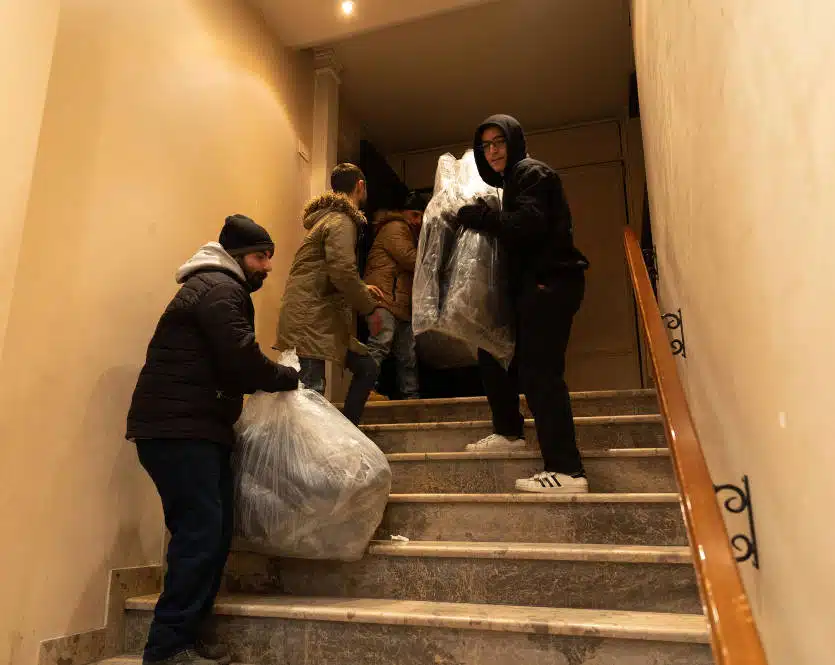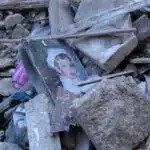Media Centre - Media release - 9 February 2023
Vulnerable children in earthquake-ravaged northern Syria urgently need food, water, blankets and sleeping bags to survive – Plan International and partner MECC

Children and their families sheltering in parts of north-west Syria devastated by two catastrophic earthquakes are in urgent need of food, water, blankets and sleeping bags, according to Plan International’s partner organisation, MECC, in Syria, which is racing to respond to the immediate needs of children and their families in the aftermath of the disaster.
“Here there are a lot of elderly people and children, and they need everything like food and meals, blankets, sleeping bags,” said Safir Salim, Field Coordinator at MECC in Aleppo, Plan International’s partner organisation.
“We are in a church, and we have here around seven big rooms under the ground, with around 1500 people. Half an hour ago exactly we had another two tremors. Any extra moving makes the people so afraid.”
Two catastrophic earthquakes struck north-west Syria and south-eastern Türkiye on Monday 6 February 2023, causing the deaths and injury of thousands of people, and leaving widespread scenes of devastation, with homes reduced to rubble and vital services destroyed.
The region is now experiencing regular aftershocks and a harsh winter snowstorm, which is hampering rescue efforts and adding to the plight of those affected. Displaced families seeking refuge in schools, churches, mosques and other temporary shelters urgently need lifesaving supplies if they are to survive in an increasingly challenging environment.
“Search and rescue efforts must be the top priority, and life-saving medical assistance, food, clean water and sanitation, and blankets to beat freezing weather conditions are also top priorities in the initial hours and days,” said Unni Krishnan, Global Humanitarian Director, Plan International.
The toll of multiple crises
Plan International is extremely concerned about the toll that yet another crisis will take on children in the region, particularly girls and their families. With schools closed, providing shelter to those who have lost their homes, children are left without their usual support frameworks.
Our experience shows that children, especially girls, women and the poorest families, are most at risk of exploitation in a disaster like an earthquake. Women and children in the disaster-zone will be at risk of exploitation and abuse, should they find themselves once again displaced. The protection and safety of children, particularly girls, must be a top priority.
“Children are often the most vulnerable in earthquake settings,” said Krishnan. “Children who have lost their parents, young girls separated from family and friends and displaced from their homes, and children with transgender parents are often more vulnerable to bullying, abuse and exploitation. Relief efforts must place children, and the most vulnerable like displaced girls, first.”
Psychological impacts on children
We are also concerned about the psychosocial impact on children. Two catastrophic earthquakes, many deaths and injuries, and scenes of twisted steel and debris where once there stood homes, along with aftershocks being felt almost every two hours, will have heightened fear and anxiety among children. Their lives are changed forever.
“The situation was devastating, children were scared,” said survivor, Mary, in Aleppo. “My son, for example, still can’t sleep and keeps asking me if something will break or fall. These long moments had a very big impact; fear, anxiety, we’re all very anxious and tired.”
Krishnan said: “A major earthquake and repeated aftershocks shake people and impact their psyche. Psychological needs are often invisible. Left unattended, they often leave lasting scars on young minds. It is critical to address the mental health needs of young survivors from day one onwards.”
Testimonies:
Georgina: “As we held our children, we had no hope of surviving.”
“We’re still in shock over what happened yesterday and haven’t fully understood it. We were asleep, then we woke up to things shaking and the sound of things breaking and rocks falling. We didn’t understand what was happening. We ran to the bathroom, then the second earthquake hit, and that was when we lost hope of surviving and started praying. I held my children and told them to pray because that was our only hope.
When the second earthquake stopped, we ran outside in our pyjamas and without any shoes. We went outside, everyone was running, and as we reached the building’s entrance, a third earthquake hit. Everyone was on the streets; rain was pouring and it was very cold. The situation was devastating, children were scared.
My son, for example, still can’t sleep and keeps asking me if something will break or fall. These long moments had a very big impact; fear, anxiety, we’re all very anxious and tired.
The earthquake repercussion kept hitting so we couldn’t reach the house. My house is damaged, debris is on the floor, dust is everywhere. We cleaned up a bit thinking we could stay there, then another earthquake repercussion hit, so we left. We stayed on the street for a while but it was raining, so we came here.
We’re grateful, we’re all here now trying to comfort each other. We are hearing that bad things might happen, more earthquakes, but we’re trying to stay strong, but the situation was very devastating and very scary. The only thought we had was that we won’t survive this.
As we held our children, we had no hope of surviving. Truly, I mean, what we lived and what others lived in these moments, other families, even the ones that didn’t survive, may they rest in peace, and thank God we survived, but during those moments, we lost hope.
We held each other, praying, and saying our goodbye while silently looking at each other.”
Mary: “We were terrified, truly terrified.”
“At 04:20 in the morning, we woke up to an earthquake. At first, we didn’t understand what happened, we were terrified, truly terrified. Once we understood that it was an earthquake, people started going down to the streets wearing whatever clothes they had on, seeking shelter.
Rain was pouring and it was very cold, but streets were the only place where we could be safe.
Just as we began to comprehend what happened, another strong earthquake hit. The second earthquake was enough reason for whoever was still at home to leave immediately. We all know that during the past 12 years, Aleppo has not been equipped to withstand two consecutive earthquakes.
We also heard that buildings were collapsing. In the early morning at around 6:00, 6:30 am, we began to understand the shock and that we just experienced two devastating earthquakes.
We learned that some people are stuck under the rubbles, and we started contacting each other to make sure that everyone is safe, and if someone we know has been affected.
We mobilised ourselves to respond to what had happened and to see how we can help.
People were seeking shelter in churches, public and open spaces, fearing what might happen next. People no longer felt safe at home.
Until then, we were still grasping the magnitude of what had happened. Then at 12:00 noon, we were surprised with a third strong earthquake. At this point, all we could do was wait.”
Since then, we’ve been trying to find and provide food to the shelters, whether to churches, public spaces, schools or open spaces. Unfortunately, food quantities are very limited.
Most people did not go to work, and those who were trying to help have no bread or basic ingredients to prepare any kind of sandwiches.
“Right now, we need food, shelter and clothing, but we also need your prayers for this crisis to pass.”
[ENDS]
Plan International Australia has now launched an emergency appeal to support its response
Media contacts


